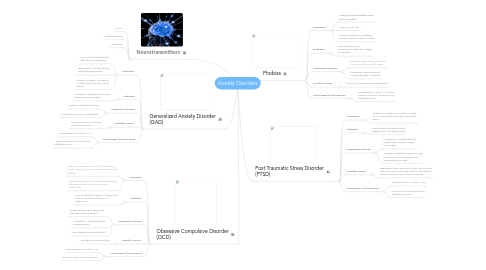
1. Neurotransmitters
1.1. GABA
1.2. Norepinephrine
1.3. Serotonin
2. Generalized Anxiety Disorder (GAD)
2.1. Symptoms
2.1.1. Can't relax, startled easily, difficulty concentrating
2.1.2. Sleep issues: Trouble falling asleep/staying asleep
2.1.3. Physical: Fatigue, headache, muscle aches, feeling out of breath
2.2. Definition
2.2.1. Excessive, exaggerated anxiety about everyday events
2.3. Medication/Therapy
2.3.1. Cognitive behavior therapy
2.3.2. Anti-anxiety and anti-depressants
2.4. Possible Causes
2.4.1. Sometimes runs in families, other times trauma
2.5. Percentage of men/women
2.5.1. Generalized: 6.8 million, 3.1
2.5.2. Women are twice as likely to be affected as men
3. Obsessive Compulsive Disorder (OCD)
3.1. Symptoms
3.1.1. Obsession symptoms: fear of dirt, shaking hands, having to have things organized and orderly
3.1.2. Compulsion symptoms: Washing/cleaning, following a strict routine, counting, orderliness
3.2. Definition
3.2.1. Unreasonable thoughts and fears that lead to repetitive behavior or obsessions
3.3. Medication/Therapy
3.3.1. Psychotherapy: ERP (Exposure and response prevention)
3.3.2. Medication: Antidepressants, antipsychotics
3.3.3. DBS (Deep brain stimulation)
3.4. Possible Causes
3.4.1. Biology and Environment
3.5. Percentage of men/women
3.5.1. Generalized: 2.2 million, 1%
3.5.2. Equal among men and women
4. Phobias
4.1. Symptoms
4.1.1. Felling of uncontrollable panic, terror or dread
4.1.2. Avoidance of fear
4.1.3. Physical Reactions: Sweating, rapid heartbeat, intense anxiety
4.2. Definition
4.2.1. Overwhelming and unreasonable fear of an object or situation
4.3. Medication/Therapy
4.3.1. Psychotherapy: Desensitization, Cognitive behavioral therapy
4.3.2. Medication: Beta blockers, Antidepressants, Sedatives
4.4. Possible Causes
4.4.1. Trauma, genetics or learned behavior
4.5. Percentage of men/women
4.5.1. Generalized: 8.7% or 19 million. Women are twice as likely to be affected as men
5. Post Traumatic Stress Disorder (PTSD)
5.1. Symptoms
5.1.1. Flashbacks, nightmares, severe anxiety and uncontrollable thoughts about the event
5.2. Definition
5.2.1. Mental health condition that's triggered by a terrifying event
5.3. Medication/Therapy
5.3.1. Medication: Antidepressants, antianxiety, Prazosin, Sleep medication
5.3.2. Therapy: Cognitive, exposure, eye movement desensitization and reprocessing (EMDR)
5.4. Possible Causes
5.4.1. Developed when you go through, see or learn about an event involving actual or threatened death, serious injury or sexual violation
5.5. Percentage of men/women
5.5.1. Generalized: 7.7 million, 3.5%
5.5.2. Women are more likely to be affected than men
